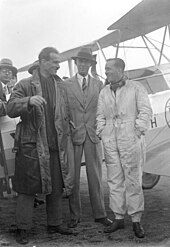Alan Samuel Butler
This article needs additional citations for verification. (April 2018) |
Alan Butler (22 November 1898 – 24 May 1987), born as Alan Samuel Butler, was a British aviator and, as claimed in his obituary in
He was born in Gloucestershire near Bristol in 1898 to Marion (née Cochran) and Samuel Butler, a prosperous merchant in Bristol and inventor holding a number of patents. His father died in July 1906 leaving 7-year old Alan wealthy. His Scottish-born mother remarried in 1913 when Alan was at Eton.

Alan Butler and his co-pilot Hubert Broad in Berlin-Tempelhof


Always an enthusiast for flying, he finished school during the
In 1921 Butler asked Geoffrey de Havilland to build him an aircraft to Butler's own specification. This new aircraft was the first DH37A and Butler named it Sylvia after his sister. Pleased with the aeroplane and impressed by the De Havilland company staff he lent his financial support to the new venture and took the chair of the De Havilland Aircraft Company and held it from 1923 until 1950.[1]
In 1925 Butler married Lois Knox-Niven (née Reid) and they had two children, a daughter Carol and a son David.[2]
He toured Europe in his new aircraft in 1923 — the first English private owner to do so — before leaving for
When he left De Havilland in 1950 there were 20,000 employees. His colleagues described him as "conscientious to a degree and outspoken almost to a fault."[1]
Butler also had a 250-ton ketch also called Sylvia and made regular trans-Atlantic voyages in her. Sylvia was fitted with a complete refrigeration plant.[1]
He was active in
Alan Butler died aged 88. He was survived by his daughter Carol Horton.[1]
References
External links
- DH.37A, G-EBDO, Sylvia Archived 8 September 2017 at the Wayback Machine
